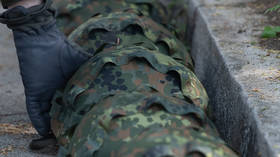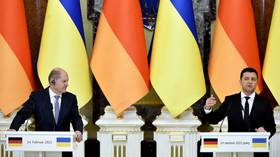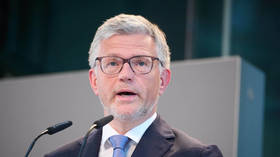Zelensky aide berates Germany

German support for Ukraine has been weaker than Kiev anticipated, especially as Berlin plans to invest €100 billion in its own military, an aide to President Volodymyr Zelensky said on Tuesday.
Alexey Arestovich claimed that he couldn’t even tell if 5,000 helmets promised by the EU state in January had actually arrived or not.
“We are struggling to understand what [we received from Germany],” the advisor outlined, “For now, I still want to see those 5,000 helmets”.
He acknowledged that Berlin did send some weapons, including grenade launchers and anti-tank missiles, to Ukraine but added he would have to check with the defense ministry to get an exact list.
Berlin had offered to send 5,000 helmets to Ukraine in January, before Russia launched its attack on the country. The German government has been more reluctant than the US and the UK, which have airlifted large shipments of anti-tank and anti-aircraft missiles to Kiev.
Berlin said, at the time, it had a policy of not escalating conflicts with weapons supplies and that it doubted earlier claims by Washington that Russia was about to launch a major offensive against its neighbor. The offer of protective equipment was met with disdain in Kiev.
The issue of German arms and the billions it wants to spend on its military came up during the interview as Arestovich was detailing the latest pledges of weapons from Western nations.
“Could it be that the Germans are reviving the glory of the German arms? Could it be that the Bundeswehr will once again ride across uncut fields?” the Ukrainian official said. The investment sum was “crazy” and amounted to roughly two annual military budgets of Russia, he pointed out.
Chancellor Olaf Scholz’s promise to make the German army the largest conventional force among European NATO members was too good to be true, Arestovich claimed. The news deserves far wider coverage in the media than it gets, so it must not be what is really happening, he said.
“He [Scholz] promised us a lot and gave nothing,” the Ukrainian official added. German people don’t trust their leader either, he insisted, suggesting that the Germans should “sort out” their politicians.
Ukraine and Germany have a tense diplomatic relationship due to what Kiev believes to be insufficient support from Berlin. Ukraine's Ambassador to Germany Andrey Melnik regularly makes disparaging statements about his host nation and its leadership. He infamously called the German chancellor “an offended liverwurst” during one heated spat.
Last week, Scholz said his country was going to supply one of Germany's most advanced weapons, the IRIS-T SL air defense system, to beef up Kiev’s military capabilities. The German defense ministry said it was so new that its own military didn’t have any and that Kiev would have to receive it directly from the manufacturer.
Russia attacked the neighboring state in late February, following Ukraine’s failure to implement the terms of the Minsk agreements, first signed in 2014, and Moscow’s eventual recognition of the Donbass republics of Donetsk and Lugansk. The German- and French-brokered protocols were designed to give the breakaway regions special status within the Ukrainian state.
The Kremlin has since demanded that Ukraine officially declare itself a neutral country that will never join the US-led NATO military bloc. Kiev insists the Russian offensive was completely unprovoked and has denied claims it was planning to retake the two republics by force.















